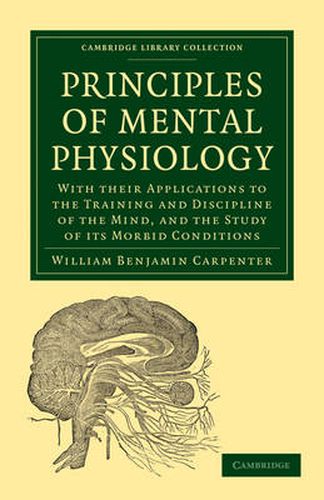Readings Newsletter
Become a Readings Member to make your shopping experience even easier.
Sign in or sign up for free!
You’re not far away from qualifying for FREE standard shipping within Australia
You’ve qualified for FREE standard shipping within Australia
The cart is loading…






William Carpenter (1813-85) was trained as a doctor; he was apprenticed to an eye surgeon, and later attended University College London and the University of Edinburgh, obtaining his M. D. in 1839. Rather than practising medicine, he became a teacher, specialising in neurology, and it was his work as a zoologist on marine invertebrates that brought him wide scientific recognition. His Principles of Mental Physiology, published in 1874, developed the ideas he had first expounded in the 1850s, and expounds the arguments for and against the two models of psychology then current - automatism, which assumed that the mind operates under the control of the physiology of the body for all human activity, and free will, ‘an independent power, controlling and directing that activity.’ Drawing on animal as well as human examples, his arguments, especially on the acquisition of mental traits in the individual, are much influenced by Darwin.
$9.00 standard shipping within Australia
FREE standard shipping within Australia for orders over $100.00
Express & International shipping calculated at checkout
William Carpenter (1813-85) was trained as a doctor; he was apprenticed to an eye surgeon, and later attended University College London and the University of Edinburgh, obtaining his M. D. in 1839. Rather than practising medicine, he became a teacher, specialising in neurology, and it was his work as a zoologist on marine invertebrates that brought him wide scientific recognition. His Principles of Mental Physiology, published in 1874, developed the ideas he had first expounded in the 1850s, and expounds the arguments for and against the two models of psychology then current - automatism, which assumed that the mind operates under the control of the physiology of the body for all human activity, and free will, ‘an independent power, controlling and directing that activity.’ Drawing on animal as well as human examples, his arguments, especially on the acquisition of mental traits in the individual, are much influenced by Darwin.